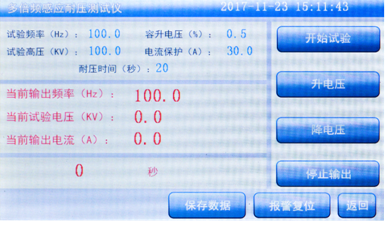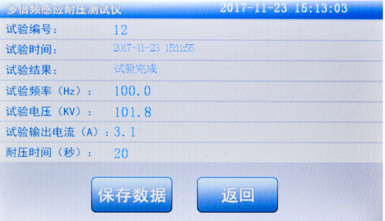ZC-506 electronic multi frequency multiplier test device is designed and manufactured to meet the above requirements. It has been proved by the majority of users that its operation is simple and its performance is reliable, which can better meet the requirements of transformer and transformer induced voltage withstand test.
In the main interface, click the "parameter configuration" menu to pop up the interface as shown in the figure.

The functions are as follows:
(1) Test number: used to distinguish and record different tests, setting range: 1-30000.
(2) Test frequency (Hz): set output frequency, setting range: 20-300
(3) PT ratio: set the variable ratio of Pt of the tested object
(4) Capacitance voltage (%): set the percentage of capacitance voltage of Pt of the test object, setting range: 0.5 ~ 15.5%
(5) Test high voltage (kV): set the target voltage value of high voltage side during test
(6) Boost amplitude (V): set the amplitude of step-up when the host voltage output
(7) Current protection (a): set the current limit value of the host output. If the secondary limit value is exceeded, the output will be shut off automatically
(8) Withstand voltage time (seconds): set the time to start timing after the voltage rise reaches the target value. After exceeding this value, the host will automatically turn off the output
(9) Voltage detection: set the sampling point to detect the output voltage of high voltage side.
Low voltage side: use the output voltage of the host, Pt transformation ratio and capacitance voltage to calculate the output voltage value of the high voltage side.
High voltage side: use the output value of voltage divider to calculate the output voltage value of high voltage side (the transformer ratio of voltage divider is 1000 by default)
(10) Test mode: set the control mode of test output
Automatic: in the test interface, after clicking "start test", the host will automatically boost to the target voltage value, Then, automatic timing, after the withstand voltage time, automatically turn off the output
Manual: in the test interface, after clicking "start test", you need to manually click "voltage rise" and "voltage drop" to adjust the output voltage value. When the voltage rise to the target value, the time will be automatically timed, and when the withstand voltage time is up, the output will be automatically turned off
Withstand voltage test
In the main interface, click the "withstand voltage test" menu to pop up the interface as shown in the figure.

1. Parameter setting area:
(1) Test frequency (Hz): output frequency setting value of the test
(2) Capacitance rise voltage (%): the set value of capacitance voltage of the test object
(3) Test high voltage (KV): the target value of high voltage side boost set in the test
(4) Current protection (A): set value of output protection current
(5) Withstand voltage time (Sec): the target value of the test withstand voltage timer
2. Display area of test process:
(1) Current output frequency (Hz): the current output frequency value of the host
(2) Current test voltage (KV): output voltage value of high voltage side
(3) Current output current (A): output current value of main engine
3. Withstand voltage time zone
When the boost voltage at the high voltage side reaches the target value, start timing and display the withstand voltage meter value. When the voltage withstands voltage meter value reaches the set value of withstand voltage time, the output will be automatically turned off.
4. User operation area
1) Start test: start output. In automatic mode, the main engine will automatically boost to the set value of high-voltage output. In manual mode, it is allowed to step up / down voltage through "voltage up" and "voltage down" buttons.
(2) Rise, single step voltage control mode
(3) Voltage reduction: in manual mode, control the host to step up the voltage
(4) Stop output: turn off the host output
(5) Save data: enter the save test data interface, as shown in the figure
(6) Alarm reset: clear the alarm information of the host
(7) Return: return to the main menu
Save data

(1) Save data: save data into internal storage
(2) Return: return to the withstand voltag







